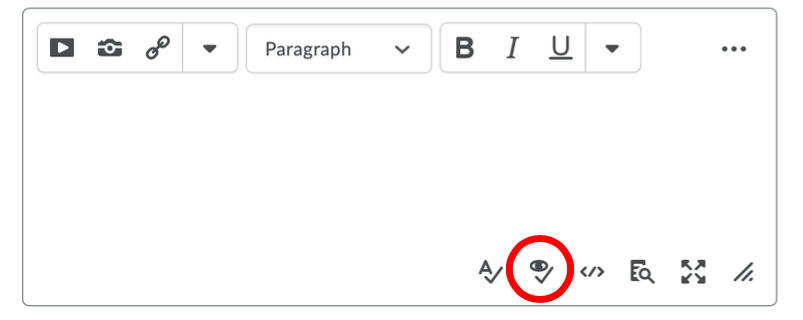Brightspace by D2L is McGill’s Learning Management System (LMS), known by staff and faculty as “myCourses”. The following resources are helpful for faculty, teaching assistants and administrators working on designing and uploading course content into myCourses. D2L has published a variety of tools and resources, some of which are curated here, to help you create and maintain an accessible virtual classroom.
Accessibility Checker
Did you know that myCourses has a built-in accessibility checker? You can use it when creating content in the HTML Editor to catch some of the most common accessibility issues, and receive tips on how to fix them!
 Figure 1: Screenshot of myCourses HTML text editor, with a red circle around the accessibility checker icon [eye with check mark]
Figure 1: Screenshot of myCourses HTML text editor, with a red circle around the accessibility checker icon [eye with check mark]

Accessible Course Template
D2L has made creating accessible course content easier by having accessibility templates available and ready to be customized to your own content.
Articles
D2L hosts a collection of articles on accessibility in Brightspace (myCourses) on their Brightspace Community website. A few articles of interest include:
- Developing accessible content
- Providing alternative learning materials
- Adding an accessible template package to your course files
There are many more articles to discover, with the content being regularly updated by D2L. Exploration and discovery are encouraged!
Webinars
D2L offers a few webinars to help with accessibility in myCourses:
- Reimagining Accessibility Online: Designing for Equity First
- How to Help Make Learning Accessible with Brightspace
Other D2L Resources
- D2L Accessibility Lab: Want to learn more about assistive technologies that some students may be using? This website provides video demonstrations that help you understand how assistive technologies work, and the barriers they may encounter in an online learning environment. The Resources tab has two accessibility audit tools that you can use to test your own content.
- You can optimize your personal account settings within myCourses to support your own accessibility needs and/or use of assistive technologies.
Resources at McGill
- Teaching and Learning Services: TLS is the main hub for instructors seeking support, resources and professional development. Here are a few offerings to pique your interest:
- Office for Students with Disabilities: For instructors looking for resources, or who have questions about the services that the OSD offers to students, you can view the OSD’s Faculty & Staff webpage
- Accessibility Advisor: supports instructors via trainings on accessibility, curating resources’ on McGill’s Equity website, and one-on-one advising. You can contact her at catherine.roy7 [at] mcgill.ca.
